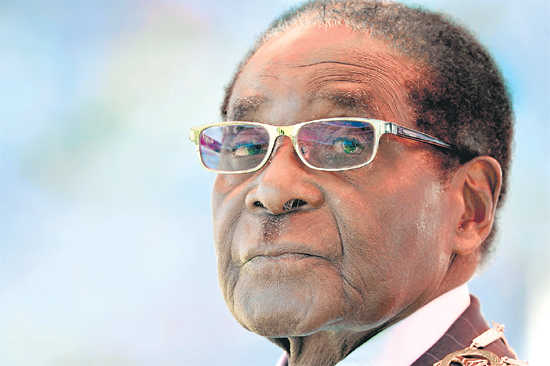
Ashis Ray
London-based senior journalist
In the course of my 40 years as a foreign correspondent, I have had the chance to have a ringside view of significant moments in world affairs. One such was the emergence of black rule in Zimbabwe, previously Rhodesia.
In December 1979, I was among the hordes of reporters at London's Lancaster House, where after more than three months of protracted negotiations chaired by the then British Foreign Secretary, Lord Peter Carrington, an agreement was reached, which ended the guerrilla uprising in the country and paved the way to a return to British colonial status from a 1965 unilateral declaration of independence by its white supremacist leader Ian Smith.
Bishop Abel Muzorewa was Zimbabwe's PM. But militants Robert Mugabe of the Zimbabwe African National Union (ZANU), identified with Maoism, and Joshua Nkomo of the Zimbabwe African People's Union (ZAPU), backed by the Soviet Union and Cuba, were signatories to the treaty.
For four months, a British governor-general — Sir Winston Churchill's grandson Lord Nicholas Soames — was restored in office. This dissolved to ZANU registering a landslide victory in the 1980 election, ushering in the 37-year Mugabe era.
Earlier, Southern Rhodesia, as it was then called, was annexed by Britain in 1923. However, by the 1960s, the UK’s policy towards Rhodesia had transformed into "no independence before majority rule". This was rejected by Smith. Britain applied to the UN for sanctions against Rhodesia and was granted these in 1966 and furthermore in 1968. London frowned upon Smith's resistance; but refrained from using force against him.
As Brutus said of and in Shakespeare's Julius Caesar, 'as he was ambitious, I slew him'. In November 2017, so did the Zimbabwean army, albeit popularly supported, when it came to Mugabe's wife Grace — 41 years his junior and with whom she started an affair while his first wife was ill — thereby ousting him. The President resigned under duress; thus, the transition was neither democratic nor ideal. But it was bloodless and few have complained.
Mugabe, now unsteady and unloved at 93, was once quite respected in his country and region. He obliterated his rival Nkomo; and tightened his grip on power. His proximity to North Korea was questionable; his running of the economy reckless. More seriously, he indulged in a bloody rigging of several elections to remain in power. After advocating reconciliation with the former white ruling classes, he forcibly captured white-owned farms — the granary of SA — and presented them to his party activists. It is estimated up to five million educated Zimbabweans out of a population of 17 million may have quit the soil over the years.
The change of personality has been welcomed. But is the 75-year-old Emmerson Mnangagwa, Mugabe's Vice-President who has now succeeded him as President, the answer to a quite literate Zimbabwean people's miseries? He delivered a politically savvy acceptance speech; but was in no way in the past distant from the crimes committed by the regime. The country is bankrupt and in need of assistance.
A lesson to be learned from developments in Zimbabwe is the shrinking of India's international pro-activity as compared to China's expanding vision of its role in global affairs. Given the inspiration Mugabe derived from Maoism in the 1970s, Beijing's involvement in Zimbabwe's politics was deep-rooted, translating into investment in its natural resources. In 2008, China vetoed a UNSC resolution which would have imposed arms and economic sanctions on Zimbabwe.
Consequently, while it has denied this, China's hand in the scenario that unfolded in Zimbabwe soon after the Zimbabwean army chief Constantino Chiwenga visited China, is a matter not to be dismissed. Mnangagwa, trained in the communist state (or should I say authoritarian capitalist system), was looked upon as being more reliable than a frail, faltering and un-pragmatic Mugabe. Besides, Mugabe's diktat to foreign investors of having to concede to majority black Zimbabwean ownership of companies was against Chinese interests, while his nationalisation of diamond mines also affected China.
In addition, in Beijing's eyes, Mnangagwa, a known devil, was much more acceptable than the diva that was Grace Mugabe, bolstered by a young brigade not dissimilar to South Africa's Winnie Mandela's once dubious support base of a murderous gang.
Interestingly, the Chinese foreign ministry made it a point to eulogise the China-Zimbabwe friendship after Mugabe stepped down. Not that Beijing cares or wishes to conceal matters, but this, arguably, gave the game away.



























